Author:
Virginia Floyd
Date Of Creation:
12 August 2021
Update Date:
1 July 2024

Content
- Steps
- Method 1 of 4: Enhancing Vision with Nutrition
- Method 2 of 4: Strengthening Vision Through Lifestyle Changes
- Method 3 of 4: Strengthening Vision with Exercise
- Method 4 of 4: Strengthening Vision with Medical Aids
- Warnings
Vision is one of our most important senses. Therefore, we must do whatever is necessary to keep our eyes healthy for as long as possible. Fortunately, there are many ways to improve and maintain vision through healthy diets, lifestyle choices, and medications and treatments.
Steps
Method 1 of 4: Enhancing Vision with Nutrition
 1 Eat more lutein. Lutein is a nutrient known as an eye vitamin. Consuming 12 mg of lutein per day helps prevent age-related macular degeneration of the eyes and other diseases. The following foods are rich in lutein:
1 Eat more lutein. Lutein is a nutrient known as an eye vitamin. Consuming 12 mg of lutein per day helps prevent age-related macular degeneration of the eyes and other diseases. The following foods are rich in lutein: - green leafy vegetables, kale, broccoli and spinach all contain quite a lot of lutein;
- fruits, especially kiwi, oranges and grapes;
- zucchini and squash.
- You can also take lutein supplements. Choose lutein-specific nutritional supplements over multivitamins - multivitamins contain too little of this nutrient. Remember, lutein is absorbed best from natural sources rather than dietary supplements.
 2 Add omega-3 fatty acids to your diet. These essential nutrients help slow macular degeneration, prevent cataract development and relieve dry eye syndrome. The best source of omega-3 fatty acids is fatty fish, especially salmon and sardines. Also, many of these acids are found in tuna, mackerel and oysters.
2 Add omega-3 fatty acids to your diet. These essential nutrients help slow macular degeneration, prevent cataract development and relieve dry eye syndrome. The best source of omega-3 fatty acids is fatty fish, especially salmon and sardines. Also, many of these acids are found in tuna, mackerel and oysters. - If you don't like seafood or are not common in your area, you can take a fish oil supplement to get enough omega-3 fatty acids.
 3 Get more vitamin A. This vitamin helps to improve vision in the dark and prevent night blindness. Some foods rich in vitamin A are listed below.
3 Get more vitamin A. This vitamin helps to improve vision in the dark and prevent night blindness. Some foods rich in vitamin A are listed below. - Carrot. For decades, carrots have been considered a good food for eyesight. Carrots are rich in vitamin A and are an excellent food for maintaining vision.
- Sweet potato.
- Eggs. They also contain lutein, so eating eggs is doubly beneficial for eyesight.
 4 Eat foods rich in vitamin C. Vitamin C helps slow down the formation of cataracts and prevents macular degeneration.The following foods are the best sources of this vitamin.
4 Eat foods rich in vitamin C. Vitamin C helps slow down the formation of cataracts and prevents macular degeneration.The following foods are the best sources of this vitamin. - Oranges. Try to get your vitamin C from whole oranges, not orange juice. This will help you avoid consuming the extra sugar found in orange juice.
- Yellow bell pepper. Just one large yellow bell pepper can provide a 500% dose of vitamin C.
- Dark leafy vegetables. Kale and broccoli are rich in vitamin C. A glass of any dark green, leafy vegetables will replenish your daily vitamin C.
- Berries. Blueberries, strawberries, blackberries and raspberries are high in vitamin C.
 5 Add zinc to your diet. Zinc promotes the production of melanin, a pigment that protects the eyes. This helps the eyes resist damage and slow down macular degeneration. There are many ways to add zinc to your diet.
5 Add zinc to your diet. Zinc promotes the production of melanin, a pigment that protects the eyes. This helps the eyes resist damage and slow down macular degeneration. There are many ways to add zinc to your diet. - Shellfish. Lobsters, crabs and oysters are high in zinc.
- Green leafy vegetables. In addition to lutein, these foods saturate the body with zinc.
- Nuts. Cashews, peanuts, almonds and walnuts are high in zinc. Nuts are also great for a snack.
- Lean red meat. In small amounts, lean red meat is a good source of zinc.
Method 2 of 4: Strengthening Vision Through Lifestyle Changes
 1 Use your computer correctly. In the digital age, many people spend hours at a computer or looking at a smartphone. This can seriously affect vision. To learn more about the best way to protect your eyes while using a computer and to avoid many eye diseases associated with smartphone and phone screens, read the article How to protect your eyes while using a computer.
1 Use your computer correctly. In the digital age, many people spend hours at a computer or looking at a smartphone. This can seriously affect vision. To learn more about the best way to protect your eyes while using a computer and to avoid many eye diseases associated with smartphone and phone screens, read the article How to protect your eyes while using a computer.  2 Maintain a healthy weight. A healthy diet not only provides the body with nutrients that are good for the eyes, it also helps to avoid diseases associated with being overweight, such as diabetes, which sometimes leads to blindness in adults. Talk to your doctor to find out your optimal weight, and then try to stick to it by monitoring your diet and exercise regimen.
2 Maintain a healthy weight. A healthy diet not only provides the body with nutrients that are good for the eyes, it also helps to avoid diseases associated with being overweight, such as diabetes, which sometimes leads to blindness in adults. Talk to your doctor to find out your optimal weight, and then try to stick to it by monitoring your diet and exercise regimen.  3 Do not smoke. Smoking leads to a variety of eye conditions, including cataracts, macular degeneration, and damage to the optic nerve. It also contributes to the development of diabetes, which also negatively affects vision. If you smoke, then quit, and if not, then don't start.
3 Do not smoke. Smoking leads to a variety of eye conditions, including cataracts, macular degeneration, and damage to the optic nerve. It also contributes to the development of diabetes, which also negatively affects vision. If you smoke, then quit, and if not, then don't start.  4 Wear sunglasses. Ultraviolet radiation from the sun increases the risk of developing cataracts and macular degeneration. Get good glasses that block 99-100% of UV rays and wear them outdoors to protect your eyes from the sun. When buying glasses, check if they have certain quality certificates, it can be the Russian PCT quality certificate or another.
4 Wear sunglasses. Ultraviolet radiation from the sun increases the risk of developing cataracts and macular degeneration. Get good glasses that block 99-100% of UV rays and wear them outdoors to protect your eyes from the sun. When buying glasses, check if they have certain quality certificates, it can be the Russian PCT quality certificate or another. 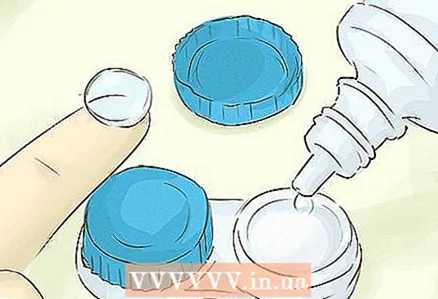 5 Take care of your contact lenses. Dirty contact lenses damage the eyes and cause infections. Take care of your contact lenses and take care of them as recommended by the manufacturer to protect your eyes from damage.
5 Take care of your contact lenses. Dirty contact lenses damage the eyes and cause infections. Take care of your contact lenses and take care of them as recommended by the manufacturer to protect your eyes from damage. - Wash your lenses after each use with a special solution recommended by your doctor.
- Wash your hands thoroughly before handling contact lenses. This will protect you from transferring bacteria from your hands to the lenses. Wash your hands with mild, unscented soap to avoid transferring chemicals and fragrances from the soap to your contact lenses, which are often eye irritants.
- Only apply makeup after you put on your lenses, and remove your makeup after you remove your lenses.
- Never sleep with contact lenses unless you are using specially designed lenses.
 6 Wear safety glasses when handling chemicals and tools. Small particles can cause significant eye damage. Be sure to wear eye protection when working with tools or chemicals so that nothing gets into your eyes.
6 Wear safety glasses when handling chemicals and tools. Small particles can cause significant eye damage. Be sure to wear eye protection when working with tools or chemicals so that nothing gets into your eyes. - Choose glasses that cover your eyes completely and even from the side.
 7 Get enough sleep. 8 hours of sleep is exactly how much you need to rest and moisturize your eyes. Get enough sleep at night and you will wake up with your eyes rested and ready for the new day.
7 Get enough sleep. 8 hours of sleep is exactly how much you need to rest and moisturize your eyes. Get enough sleep at night and you will wake up with your eyes rested and ready for the new day.
Method 3 of 4: Strengthening Vision with Exercise
 1 Ask your doctor what eye exercises you can do. Although not all doctors are convinced that exercise can improve vision, some doctors recommend it for certain vision problems, such as difficulty focusing, amblyopia ("lazy eye"), and strabismus. Ask your doctor if exercise is good for you, and your doctor will likely recommend some of the exercises listed below.
1 Ask your doctor what eye exercises you can do. Although not all doctors are convinced that exercise can improve vision, some doctors recommend it for certain vision problems, such as difficulty focusing, amblyopia ("lazy eye"), and strabismus. Ask your doctor if exercise is good for you, and your doctor will likely recommend some of the exercises listed below.  2 Blink for a few minutes. While blinking is not an exercise, it is essential for eye health. A common problem for people working at a computer or watching TV is that they rarely blink, which makes their eyes tired and dry. Take a break from work and blink every 3-4 seconds for two minutes. This will moisturize your eyes and relieve fatigue.
2 Blink for a few minutes. While blinking is not an exercise, it is essential for eye health. A common problem for people working at a computer or watching TV is that they rarely blink, which makes their eyes tired and dry. Take a break from work and blink every 3-4 seconds for two minutes. This will moisturize your eyes and relieve fatigue. 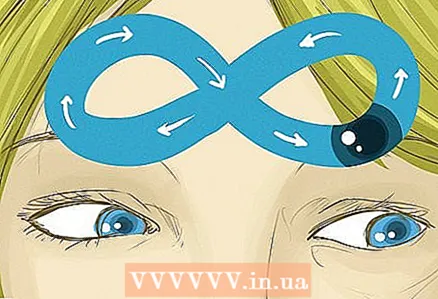 3 Draw the number 8 with your eyes. Contouring certain shapes with the eyes helps to strengthen the eye muscles and improve vision.
3 Draw the number 8 with your eyes. Contouring certain shapes with the eyes helps to strengthen the eye muscles and improve vision. - To begin with, slide your eyes through 8.
- When your eyes get used to describing 8 in one direction, try describing 8 in the opposite direction.
- Then turn 8 to its side to make an infinity sign. Describe this sign in one direction, then in the other.
- When you get tired of using your eyes to describe 8, try using your eyes to describe other shapes.
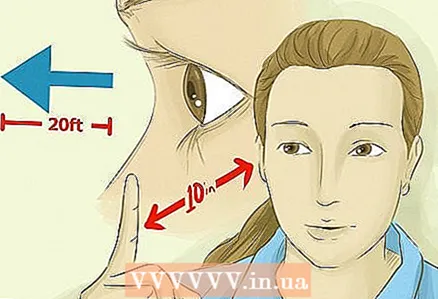 4 Change the focus on near and far objects. This exercise helps your eyes stay focused when you look at different objects at different distances.
4 Change the focus on near and far objects. This exercise helps your eyes stay focused when you look at different objects at different distances. - Extend your finger about 25 cm from your face. Focus on him.
- Then switch your gaze to an object that is about 50 cm away from you.
- Switch your gaze from your finger to the subject every few seconds. Do the exercise for about three minutes.
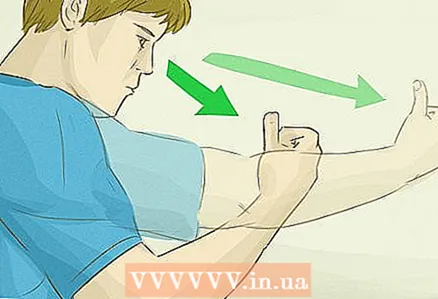 5 Focus your gaze on your hand by moving it towards your face. This will help you focus better on moving subjects.
5 Focus your gaze on your hand by moving it towards your face. This will help you focus better on moving subjects. - Extend your arm fully in front of your face. Put your thumb up and focus on it.
- Move your finger towards you until it is about 7 cm from your face. Focus on your finger all the time.
- Then extend your hand again and focus on your finger again.
Method 4 of 4: Strengthening Vision with Medical Aids
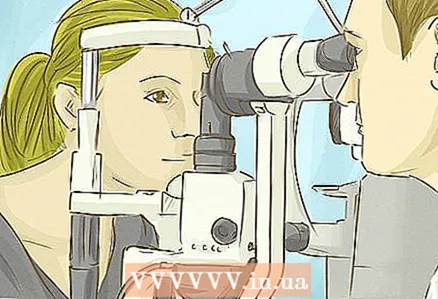 1 See your doctor regularly. Get your vision checked by an ophthalmologist at least once a year. The doctor will conduct a complete examination and, if there are problems, will be able to identify them. Some diseases, such as cataracts and macular degeneration, are best identified early in order to treat them early. The doctor will also give advice on choosing contact lenses and lifestyle choices that will help protect your vision.
1 See your doctor regularly. Get your vision checked by an ophthalmologist at least once a year. The doctor will conduct a complete examination and, if there are problems, will be able to identify them. Some diseases, such as cataracts and macular degeneration, are best identified early in order to treat them early. The doctor will also give advice on choosing contact lenses and lifestyle choices that will help protect your vision. - Be sure to tell your doctor if you have any medical conditions, even if they seem unrelated to the eyes. Health problems such as high blood pressure and diabetes affect vision, and therefore your doctor needs to know your medical history.
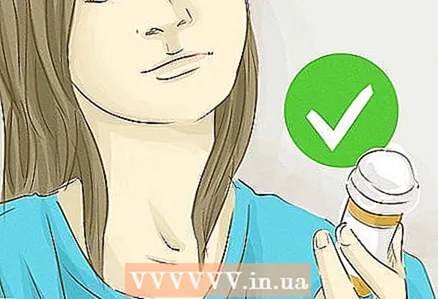 2 Carefully read the instructions for the drugs you are taking. Some medications alone or in combination with other medications have a negative effect on vision. If you regularly take any medications and notice that your vision has deteriorated, then ask your doctor or pharmacist about the possible side effects of the drug or combination of drugs.
2 Carefully read the instructions for the drugs you are taking. Some medications alone or in combination with other medications have a negative effect on vision. If you regularly take any medications and notice that your vision has deteriorated, then ask your doctor or pharmacist about the possible side effects of the drug or combination of drugs. 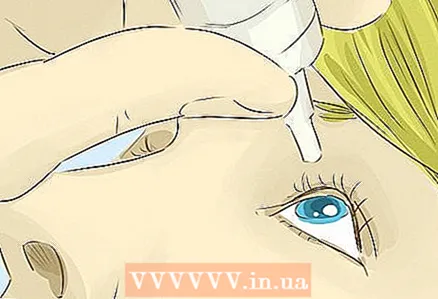 3 Ask your doctor to prescribe eye drops for you. If you suffer from chronic eye inflammation or experience any discomfort, ask your doctor to prescribe treatment for you. For example, with dry eye syndrome, cyclosporine drops are prescribed to promote tear production. If you have any eye problems, see your doctor and find out what medications you can use.
3 Ask your doctor to prescribe eye drops for you. If you suffer from chronic eye inflammation or experience any discomfort, ask your doctor to prescribe treatment for you. For example, with dry eye syndrome, cyclosporine drops are prescribed to promote tear production. If you have any eye problems, see your doctor and find out what medications you can use. 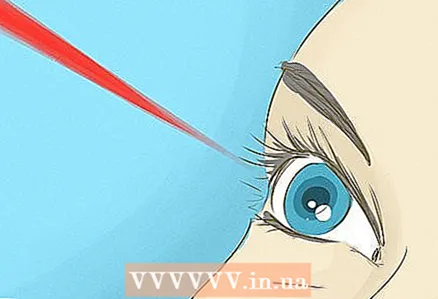 4 Consider laser surgery. LASIK (acronym for Laser-Assisted in Situ Keratomileusis) is a vision correction surgery in which a laser reshapes the cornea. This improves the ability of the eye to focus and, as a result, vision. LASIK surgeries are most often successful, but can be expensive and results are inconsistent. Discuss with your doctor if this type of vision correction will be helpful in your case.
4 Consider laser surgery. LASIK (acronym for Laser-Assisted in Situ Keratomileusis) is a vision correction surgery in which a laser reshapes the cornea. This improves the ability of the eye to focus and, as a result, vision. LASIK surgeries are most often successful, but can be expensive and results are inconsistent. Discuss with your doctor if this type of vision correction will be helpful in your case.
Warnings
- Be sure to consult with your doctor before making significant changes to your diet or lifestyle, or using any eye products. Without proper advice, you risk impairing your eyesight.
- Use dietary supplements exactly as directed. The correct doses of nutrients are beneficial, but higher doses can harm your body.



